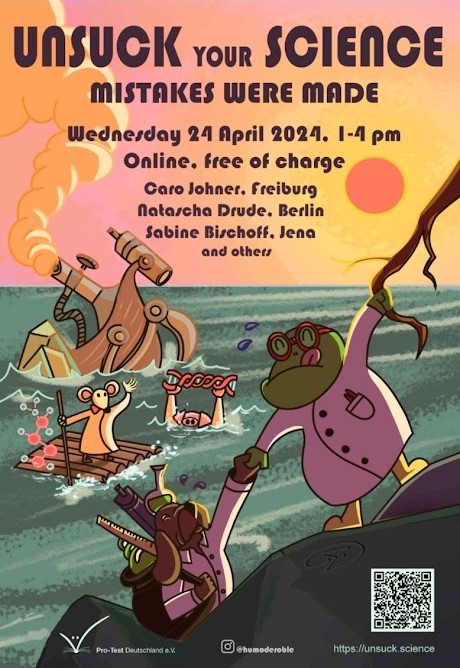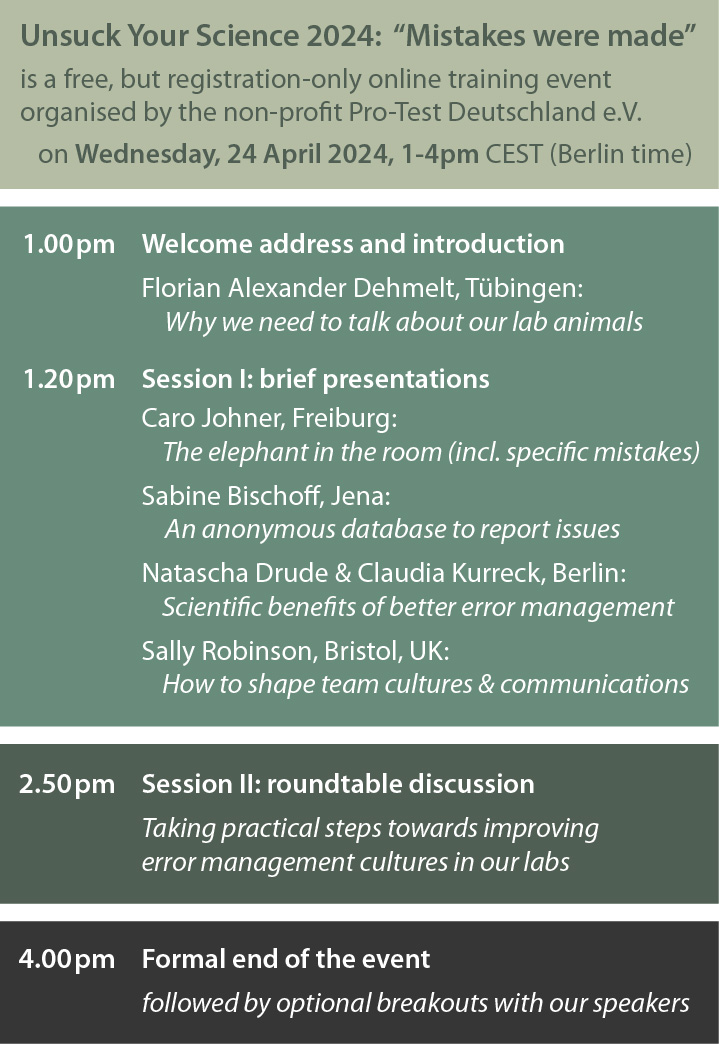This is an English-language event – scroll down to find out more, just below the German-language teaser! 🙂

Wo auch immer Menschen arbeiten, passieren Fehler. Das ist ganz normal… aber es ist keineswegs egal. Sondern ein Grund mehr, genauer hinzuschauen, einander auf Probleme hinzuweisen und gemeinsam nach Lösungen zu suchen. Denn wenn es besser geht, müssen wir es auch besser machen – das sind wir unseren Tieren schuldig.
Deshalb haben wir „Unsuck Your Science“ auf die Beine gestellt. Und am Mittwoch, 24. April 2024 ist es wieder soweit…
Macht mit, registriert Euch für das Event (und sammelt ggf. auch Stunden für Euren Job oder Credits für Euer Studium)!

Event summary
In 2021, 500 junior scientists got together and discussed ways to improve animal research. As we said back then,
“We want to do our job well. We care about our research. And though almost everyone around is well-intentioned, we can see much we don’t like – a flawed analysis here, a missing control experiment there, wishful thinking by our boss. Because we’re often the only ones to see that something’s broken, we’re also the only ones who can fix it. This holds especially true when performing animal experiments. We care about our lab animals. Taking responsibility for the life and death of another creature is never easy, but if done correctly, animal experiments can be both ethically sound and scientifically valid. So how do you know you’re doing it right? And how can you do even better in the future?“
Back then, we had a great start sharing 8 different ways to improve our interactions with lab animals. But even with the best of intentions, things can go wrong… and sometimes, you’re the one who screwed up. So what do you do next?
Join us for the second edition of “Unsuck your Science” – on Wednesday 24 April 2024, 1-4 pm CEST, with optional breakout rooms from 4-5pm.
In our online seminar, researchers will share their memories of when they realised they screwed up bad; how they learned about problems from their colleagues; how they fixed them; and how they told the rest of the world about it. We then want to hear from you whether these approaches could make a difference in your lab life – and what kind of support you’ll need to make it happen! After the core event, you may engage in open discussion with some of our speakers and members of our organisation in virtual break-out rooms.
The event will be held in English and is free of charge.
Speakers
- Florian Alexander Dehmelt, Pro-Test Deutschland e.V.
Florian is one of the many volunteers who keep our non-profit group running. (And he has an actual job, too, doing research as a neuroscientist at Tuebingen University.) He will share some of the things we experienced discussing lab animals in public – and he will spotlight how mistaken public perceptions of science shape our own everyday work experience. - Caro Johner, Head of the Animal Facility, Max Planck Institute for Immunobiology and Epigenetics, Freiburg
As a veterinarian, Caro Johner has conducted and supported a wide variety of biomedical research projects. At our event, she will share specific examples of mistakes being made concerning the work with lab animals across research disciplines, and how they might be avoided. Aside from her day job, Caro Johner is also the current honorary secretary of the German Society of Lab Animal Science, or GV-SOLAS. - Sabine Bischoff, Jena University Hospital
Sabine Bischoff currently serves as President of GV-SOLAS. She is also an animal welfare officer at Jena University Hospital, and has for many years dedicated her efforts to CIRS-LAS, a database to which any individual can anonymously report „critical incidents“ involving lab animals, so that others may learn from them instead of having to repeat them. - Natascha Drude, Head of Responsible PrecliniX, BIH QUEST Center for Reproducible Research, Charité Berlin and
Claudia Kurreck, PREMIER Project Coordinator and Quality Manager, BIH QUEST Center for Reproducible Research, Charité Berlin
At the Berlin Institute of Health, Natascha Drude and Claudia Kurreck strive to help others improve the quality and reproducibility of biomedical research. And they have experienced first-hand how dealing with mistakes proactively doesn’t just improve the welfare of lab animals, but scientific outcomes as well. - Sally Robinson, Vice President of the Institute of Animal Technology; previously with the UK National Centre for the 3R (NC3Rs), and AstraZeneca UK
Knowing about the potential benefits of a change isn’t enough – we must also empower people to actually make the change. Sally Robinson has extensive and published experience in error management and will help us explore how team cultures shape work experiences, and how both junior and senior team members can drive improvements that benefit everyone.
Is this event for me?
This event is open to anyone who’s interested.
We encourage English-speaking junior researchers across disciplines (BSc students to postdocs), especially those with hands-on experience working with lab animals, or with plans to experience such work in the future, to register for our event.
Our event has no explicit geographic focus, but in case specificity is required (e.g., with respect to regulations and other legal aspects), the situation in Germany will be emphasised.
How to earn training credits („Fortbildungsstunden“ etc.):
Each participant attending via Zoom for all or most of the event duration will receive a formal PDF certificate including their name and affiliation as provided during registration. The certificate will also list the duration of the event, as well as a detailed description of its content. Feel free to submit this certificate to your own institution if you need to earn legally mandated continuous-training points (Fortbildungsstunden) for lab animal professionals, or you would like to convert it into course credit if you’re a student enrolled in a related programme.
Please note: In the past, many institutions have been happy to count participation in our event towards these goals. However, whether your institution will accept it, and how many training hours or credits they will award, is entirely up to their own policies. Please get in touch with them beforehand to make sure things will work out the way you want!
The event and its content is aligned with the goals of GV-SOLAS, the German Society for Lab Animal Science, and some of our speakers are personally involved with the organisation. As a matter of policy, however, they do not endorse, nor can they directly award official training points for an open event such as ours, and they are not responsible for any of the content of our event.
Registration
Registration is now open! The name and (optional) affiliation you provide will be listed on your certificate.